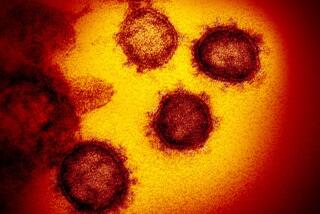Cancer, Virus Links Raise Hopes for Tumor Vaccines
- Share via
SAN DIEGO — Viruses probably cause more cancers than previously suspected, raising new hope for developing vaccines to prevent some tumors, says the director of the National Cancer Institute.
“We’re now back in the business of looking at viruses as a cause of cancer,” Dr. Vincent T. DeVita Jr. said during the American Cancer Society’s science writers’ seminar.
” . . . We probably have underestimated the role viruses play in human cancer,” he said. “We’re probably going to find a great deal more of these viruses that cause human cancer.”
Because a virus can be used to create specific antibodies to combat its own kind, “a vaccine won’t be difficult to develop,” he said.
Acknowledging that the idea of virus-caused cancers could “scare the public half to death,” DeVita emphasized that cancers now known to stem from viruses cannot be transmitted by sneezes or other casual contact.
Virus Transmission ‘Not Easy’
“You need very intimate contact” through sex or exposure to contaminated, transfused blood, he said. “It’s not easy, thank God.”
Recent reports that several people in North Carolina developed cancer of the blood cells after being visited by someone with the disease may turn out to be nothing more than coincidence, he said.
The idea that viruses can cause human cancer drew intense scientific interest in the late 1950s and early ‘60s after viruses were found responsible for cancers in animals, DeVita said. But the concept faded when research efforts failed to establish definite links with human tumors, he added.
In the late 1970s, however, the NCI’s Dr. Robert Gallo discovered a form of leukemia was caused by a virus that invades human T cells--white blood cells that are part of the body’s disease-fighting immune system, DeVita said.
The virus, called HTLV-I, or human T-cell lymphotrophic virus-I, is related to HTLV-III, which Gallo last year identified as the likely cause of deadly AIDS, the acquired immune deficiency syndrome.
For reasons not yet understood, DeVita said, HTLV-I causes the rapid proliferation of T cells in adult T-cell leukemia, while HTLV-III kills the same cells to cause the crippling of the immune system characteristic of AIDS.
May Be Responsible for Lymphomas
DeVita said he believes viruses will prove responsible for most lymphomas, cancer of the lymph nodes.
“Evidence is very strong that people with liver cancer have had prior exposure to the hepatitis virus,” he added. “ . . . I have little doubt hepatitis vaccine will not only wipe out hepatitis, but liver cancer.”
DeVita said there also is good evidence that papilloma viruses, which normally cause warts, cause tumors of the cervix in women.
However, cancer biologist William Haseltine of Boston’s Dana Farber Cancer Institute called the possibility of a vaccine against development of benign and malignant cervical tumors “a distant potential.”
DeVita said he would not exclude the possibility that viruses might cause some Hodgkin’s disease and might help trigger the tumor-forming process in breast cancer, though not actually cause the cancer. And he noted that the virus that causes infectious mononucleosis has been associated with Burkitt’s lymphoma, a type of blood cancer fairly common in Africa.
The NCI now spends about $100 million annually investigating the role of viruses in cancer, DeVita said.





